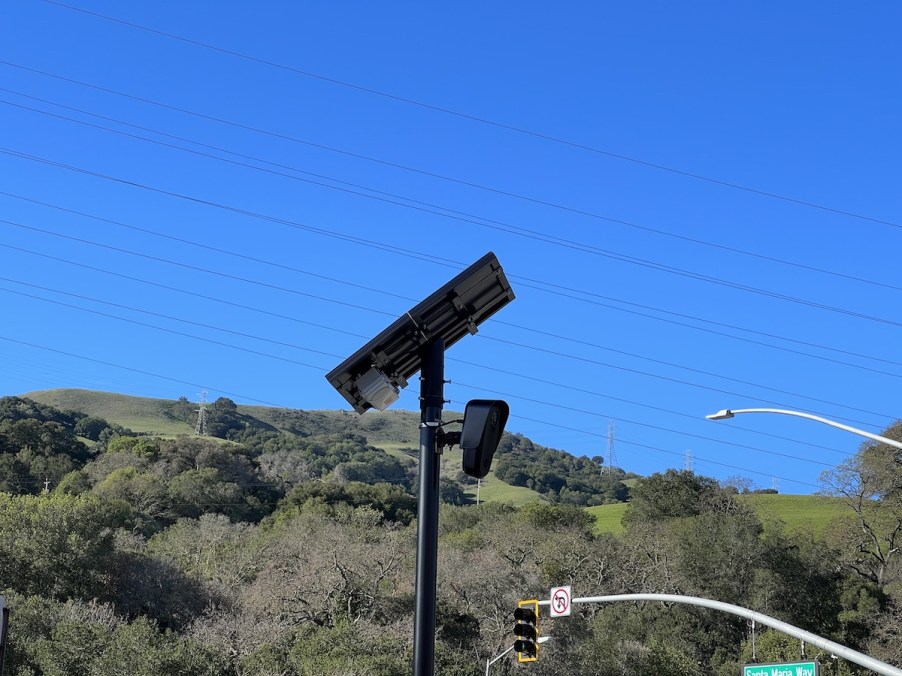
License Plate Readers: Is Your Privacy Really at Risk?
Have you ever noticed those cameras on streetlights and wondered what they’re doing while cars drive by? It’s easy to ignore license plate readers, but you might want to know more about what these surveillance devices are doing. Some critics even question whether traffic cameras are legal.
License plate readers are watching you

Most cameras on streetlights or near traffic signals are automatic license plate readers (ALPRs).
According to the Electronic Frontier Foundation, “ALPRs are high-speed, computer-controlled camera systems that are typically mounted on street poles, streetlights, highway overpasses, mobile trailers, or attached to police squad cars. ALPRs automatically capture all license plate numbers that come into view, along with the location, date, and time. The data, which includes photographs of the vehicle and sometimes its driver and passengers, is then uploaded to a central server.”
Law enforcement can use ALPR-collected data in various ways. For instance, police can use the information to track a car with an APB (all-points bulletin) on it. These cameras are a powerful tool because the authorities don’t have to be present to collect the data.
In addition, cops can use the information to stop cars with a suspended registration or a driver with a suspended license. And police can use the data to determine where a vehicle has been in the past. That could mean whether a car was at a crime scene or any other place of interest, such as a church, gun shop, health center, or protest site.
Drivers have no choice but to display their license plates on their vehicles. So motorists cannot consent to having their license plates scanned and data uploaded to servers for future reference.
Some advocates claim license plate readers are illegal
ALPRs capture a few pieces of information to upload to a server. Not only is the license plate number captured but also the location and time of every scan. This data is then uploaded to a regional sharing system. This information is often held for years or even indefinitely.
Maintaining a database of people’s everyday movements causes many critics to believe ALPRs infringe on citizens’ privacy.
“Automatic license plate readers have the potential to create permanent records of virtually everywhere any of us has driven, radically transforming the consequences of leaving home to pursue private life, and opening up many opportunities for abuse,” the ACLU says.
“In our society, it is a core principle that the government does not invade people’s privacy and collect information about citizens’ innocent activities just in case they do something wrong. Clear regulations must be put in place to keep the government from tracking our movements on a massive scale.”
Law enforcement’s use of ALPRs can help track down crime suspects. But to gather this information, the police scan all drivers’ license plates and save that data. Also, police forces aren’t the only ones using ALPRs. Private firms, such as repo companies, also use these cameras and share their gathered information with the police, with little protection of citizens’ privacy.
Some people are willing to go to court to protect their privacy
Raul Mas of Coral Gables, Florida, was incensed enough about ALPRs tracking his movements that he decided to sue.
“These cameras operate 24 hours a day, seven days a week, 365 days a year or night,” Mas told CBS Miami in May 2022. “It doesn’t matter, and those images are being stored for three years. I don’t have any criminal background, criminal record. That I know of, I’m not under any criminal suspicion. Yet the government knows where I am, where I go, what I do, who I hang out with, who I talk to, who my doctor is.”
Coral Gables Police Chief Ed Hudak responded by saying his department has safeguards to protect people’s privacy. He added that only the police view the information when trying to solve a crime or apprehend a subject.
Mas’ attorney, Sheng Li, calls the ALPRs a “warrantless surveillance and a constitutional violation.” Li says, “Citizens have a right to privacy to the history of their movements, and it’s the extended recording of tracking their movement that violates the expectation of privacy.”
Mas lost his case in Miami-Dade circuit court. He has filed an appeal.


